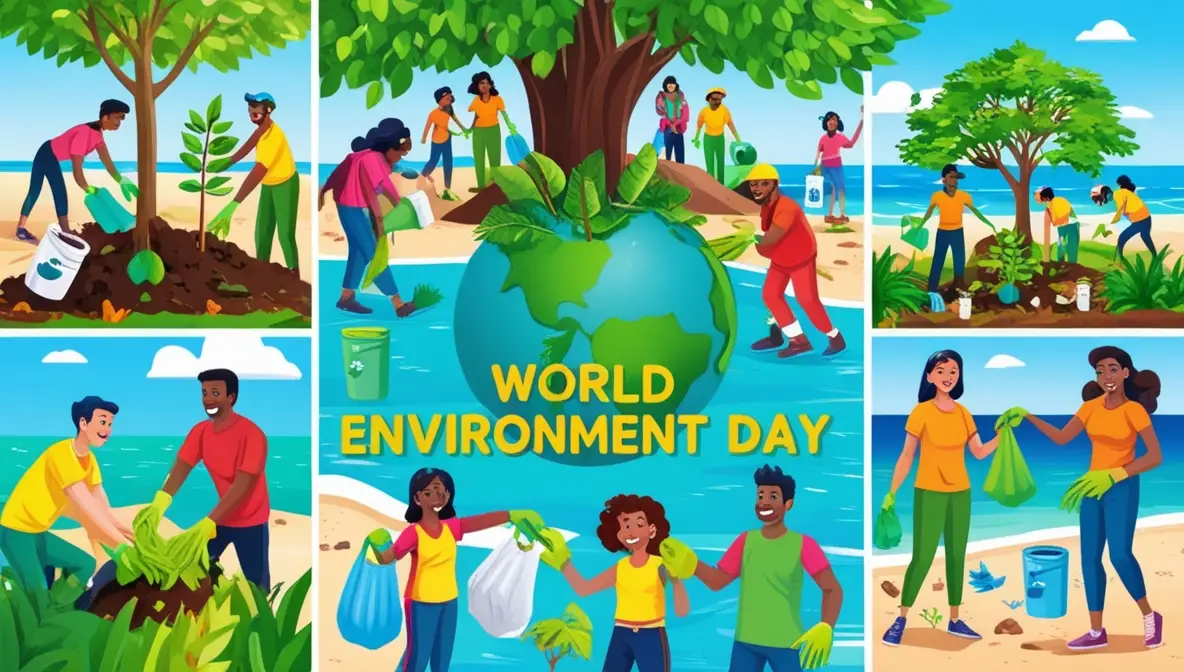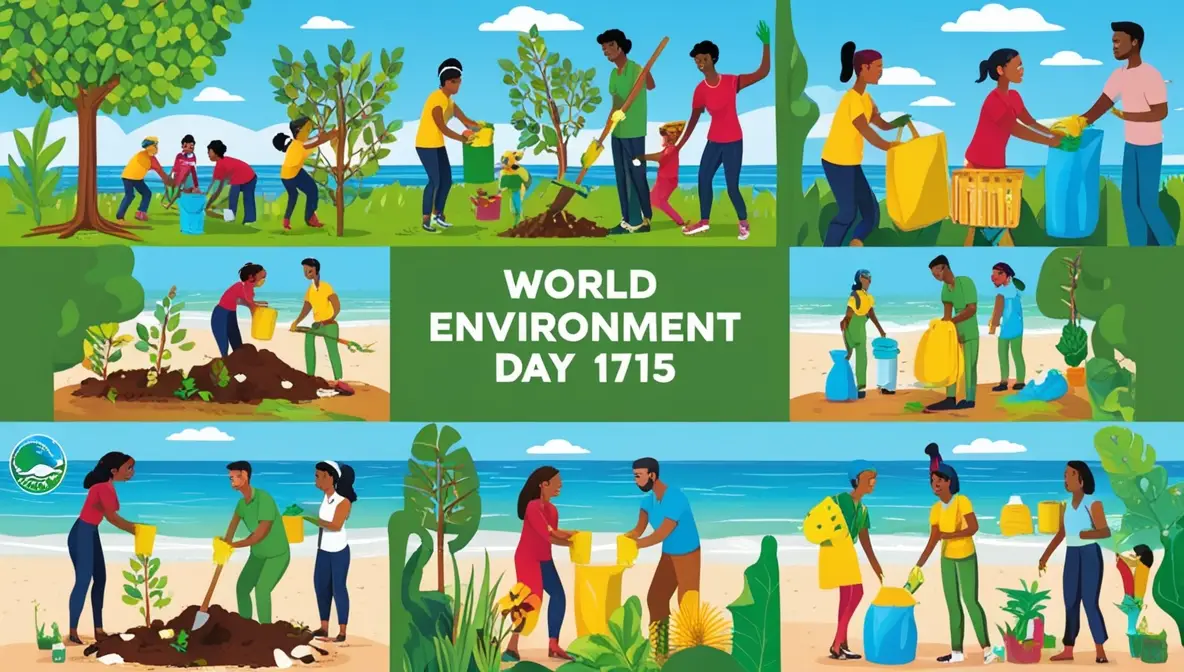World Environment Day: Taking Action for a Sustainable Future
World Environment Day, celebrated every year on June 5th, is a global initiative to raise awareness and promote action for the protection of our environment. Established by the United Nations in 1972, it serves as a reminder of the importance of caring for our planet and encourages individuals, communities, and governments to take positive environmental action.

- Thursday,June 05 2025
- Friday,June 05 2026
- Saturday, June 05 2027
- Monday, June 05 2028
As environmental challenges such as climate change, deforestation, pollution, and biodiversity loss grow more urgent, World Environment Day offers a platform for change. With the theme changing annually, the day focuses on key issues and inspires collective action to protect our planet for future generations.
History and Purpose of World Environment Day
World Environment Day was first celebrated in 1974, following the establishment of the United Nations Environment Programme (UNEP) in 1972. The event was created to encourage global environmental awareness and action. Over the decades, it has become the largest global platform for environmental outreach, with millions of people across more than 150 countries participating in various activities.
The primary purpose of World Environment Day is to:
- Raise Awareness: By focusing on pressing environmental issues, the event educates the public about the challenges our planet faces and the importance of environmental conservation.
- Encourage Action: Whether at a local or global level, World Environment Day inspires individuals, organizations, and governments to take action to protect natural ecosystems.
- Advocate Policy Change: Through global partnerships and policy initiatives, the event promotes sustainable development, urging governments to enact environmental policies that protect natural resources and promote sustainability.
Each year, a different country hosts World Environment Day and selects a theme that highlights specific environmental concerns. Themes from recent years have included topics such as plastic pollution, biodiversity, and air pollution.
The Importance of World Environment Day
World Environment Day serves as a powerful reminder of the interconnectedness of human activities and the environment. It highlights the need for collective action to combat environmental degradation. Here’s why World Environment Day matters:
- Promotes Sustainable Practices: The day encourages people to adopt environmentally friendly practices in their daily lives, such as reducing waste, conserving energy, and supporting sustainable agriculture.
- Engages Communities: Through activities like tree planting, community clean-ups, and environmental education programs, World Environment Day engages people at the grassroots level and empowers them to make a difference.
- Inspires Global Action: Governments, businesses, and organizations use this day to showcase their environmental initiatives and make commitments to more sustainable practices.
- Highlights Urgent Environmental Issues: With each theme, World Environment Day focuses attention on critical environmental challenges, from deforestation to ocean pollution, urging immediate action to address these problems.
Themes and Global Initiatives
Every year, World Environment Day focuses on a specific theme that reflects urgent environmental challenges. Recent themes include:
- 2023: “Beat Plastic Pollution”: With plastic waste overwhelming our oceans and ecosystems, the 2023 theme highlighted the need for reducing plastic consumption and improving recycling efforts. The campaign raised awareness about single-use plastics and promoted alternatives that minimize environmental impact.
- 2022: “Only One Earth”: Revisiting the theme from the first World Environment Day in 1974, this initiative focused on promoting sustainable living in harmony with nature. It emphasized the need to shift towards greener economies and lifestyles to protect our planet.
- 2021: “Ecosystem Restoration”: In the context of biodiversity loss and environmental degradation, the 2021 theme focused on restoring damaged ecosystems and promoting conservation efforts worldwide.
Each theme aligns with broader global efforts, such as the UN’s Sustainable Development Goals (SDGs), particularly Goal 13 (Climate Action), Goal 14 (Life Below Water), and Goal 15 (Life on Land). These global initiatives aim to build a more sustainable and resilient future by addressing critical environmental issues.
How You Can Participate in World Environment Day
Participating in World Environment Day doesn’t require large-scale action—small steps can make a significant impact. Here are some simple ways to get involved:
- Reduce Plastic Use: Start by minimizing single-use plastics in your daily life. Opt for reusable bags, bottles, and containers. Reducing plastic waste helps protect marine life and reduces the burden on landfills.
- Plant Trees: Trees play a crucial role in absorbing carbon dioxide and providing habitats for wildlife. Participating in tree-planting initiatives or even planting a tree in your backyard can contribute to environmental restoration.
- Join Community Clean-ups: Organize or participate in a local clean-up event. Removing litter from parks, beaches, and public spaces helps reduce pollution and protect wildlife.
- Educate Others: Use social media to raise awareness about environmental issues. Sharing articles, facts, and personal actions can inspire others to take part in protecting the planet.
- Support Sustainable Brands: Choose products from companies that prioritize sustainability. From eco-friendly packaging to ethical sourcing, supporting green businesses can drive demand for sustainable practices.

The Role of Governments and Corporations
While individual actions are essential, governments and corporations play a critical role in addressing environmental challenges. World Environment Day provides an opportunity for policymakers and businesses to commit to environmental protection through sustainable practices and green policies.
- Government Policies: Governments can enact policies that reduce carbon emissions, protect biodiversity, and promote renewable energy. International agreements, such as the Paris Agreement on climate change, are essential in driving global efforts to mitigate the impacts of climate change.
- Corporate Responsibility: Corporations can reduce their environmental footprint by adopting sustainable supply chains, minimizing waste, and investing in renewable energy. Many companies use World Environment Day to launch sustainability initiatives or announce progress toward environmental goals.
Through partnerships between governments, businesses, and communities, the potential for significant environmental improvement is vast. World Environment Day acts as a platform to bring these stakeholders together for coordinated, impactful action.
Environmental Challenges We Face Today
Despite the global attention brought by World Environment Day, the planet continues to face serious environmental challenges. Understanding these issues is critical to developing effective solutions:
- Climate Change: Rising global temperatures and extreme weather events, such as hurricanes, floods, and droughts, are increasingly linked to human activities. Reducing greenhouse gas emissions is vital to mitigate the worst effects of climate change.
- Deforestation: The loss of forests, particularly in tropical regions like the Amazon, contributes to biodiversity loss and climate change. Protecting and restoring forests is essential for maintaining biodiversity and carbon sequestration.
- Ocean Pollution: Plastic waste, chemicals, and other pollutants are devastating marine ecosystems. Protecting oceans requires reducing waste, cleaning up existing pollution, and regulating industrial activities that harm marine life.
- Biodiversity Loss: The destruction of habitats due to deforestation, industrial agriculture, and urbanization has led to a decline in species. Protecting wildlife and restoring ecosystems are critical to reversing biodiversity loss.
The Future of World Environment Day
Looking ahead, World Environment Day will continue to grow as a global platform for environmental advocacy. As awareness of environmental challenges increases, so does the potential for widespread action. Future themes will likely focus on emerging issues such as climate adaptation, sustainable development, and environmental justice, ensuring that everyone—regardless of location or background—can contribute to a more sustainable future.
By engaging more people through education, participation, and policy change, World Environment Day has the potential to drive global environmental efforts to new heights, making the world a healthier, greener, and more sustainable place for all.


